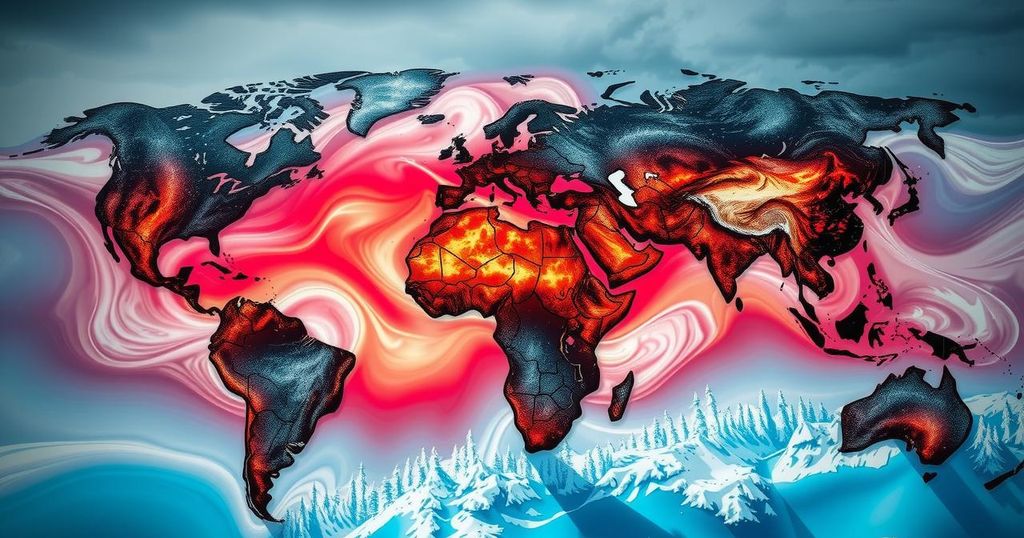2024 is projected to be the hottest year ever recorded, with concentrations of greenhouse gases reaching unprecedented levels, as highlighted by the WMO. In response to escalating climate impacts, leaders urge immediate action for emissions reduction and climate adaptation initiatives. The WMO’s ongoing efforts underline the global community’s shared responsibility in combating climate change and enhancing public health through improved climate services.
The year 2024 is anticipated to be the hottest on record, culminating a decade characterized by exceptionally high temperatures attributed to human activities, as asserted by the World Meteorological Organization (WMO). Greenhouse gas concentrations are reaching unprecedented levels, compelling the planet to absorb more heat in the years to come. UN Secretary-General António Guterres proclaimed, “Today I can officially report that we have just endured a decade of deadly heat… This is climate breakdown — in real time. We must exit this road to ruin — and we have no time to lose.” He emphasized that by 2025, nations are required to significantly reduce emissions and transition towards renewable energy sources.
The WMO is preparing to release the consolidated global temperature figure for 2024 in January, with an exhaustive report covering the State of the Global Climate expected in March 2025. Reflecting on her tenure, WMO Secretary-General Celeste Saulo remarked, “In my first year as WMO Secretary-General, I have issued repeated Red Alerts about the state of the climate.” She also underscored the shared responsibility of humanity to act promptly to ensure a safer planet, especially in light of the 75th anniversary of the WMO in 2025.
Furthermore, Saulo pointed out, “Every fraction of a degree of warming matters, and increases climate extremes, impacts and risks.” The interplay of climate change and extreme weather phenomena has become increasingly evident, with 2024 witnessing catastrophic rainfall, flooding, heatwaves exceeding 50 °C, and ferocious wildfires globally. These occurrences highlight the pressing need of the Early Warnings for All initiative, pivotal to WMO’s climate adaptation efforts.
Looking ahead to 2025, the WMO will prioritize the preservation of the cryosphere, in remembrance of the International Year of Glaciers’ Preservation, with collaborations between UNESCO and WMO expected to drive this initiative. Throughout 2024, reports from the WMO community have documented the rapid acceleration of climate change and its profound repercussions on sustainable development.
A study conducted by World Weather Attribution revealed that climate change has intensified 26 of the 29 weather-related events causing at least 3,700 fatalities and displacing millions, emphasizing the urgent need for enhanced international cooperation to manage extreme heat risks. In a responsive move to the UN Secretary-General’s Call to Action, a coalition of experts from various organizations convened at WMO headquarters to formulate a systematic approach tackling the extreme heat threat. These initiatives aim to bolster public health via improved climate services and early warning mechanisms. As it approaches its 75th anniversary, the WMO pledges to continue its mission of international collaboration to evaluate and address the climate crisis, encompassing mitigation and adaptation efforts.
Climate change has reached a critical juncture, with 2024 projected to surpass previous records of heat due to human-induced environmental changes. The WMO has raised alarms regarding increasing greenhouse gas emissions and their contributions to global warming, which predisposes societies to more frequent and severe weather events. The compounded effects of climate change not only threaten natural ecosystems but also pose significant risks to human lives and infrastructure. In addressing these concerns, international cooperation and strategic implementations of climate mitigation and adaptation strategies are paramount.
In conclusion, the findings underscore the urgent action required to counter the ongoing climate crisis epitomized by the record heat projections for 2024. With every increment of temperature exacerbating extreme weather events, global collaboration towards emission reduction, climate adaptation, and enhanced awareness of climate risks is critical. The continuing efforts by the WMO and international bodies highlight the need for a collective response to secure a sustainable future against the looming perils of climate change.
Original Source: wmo.int






